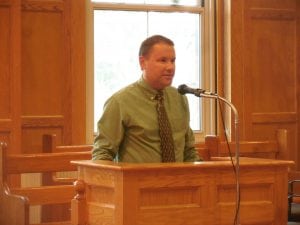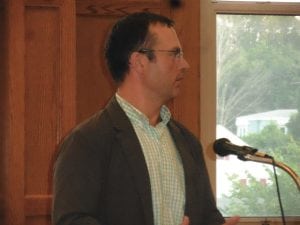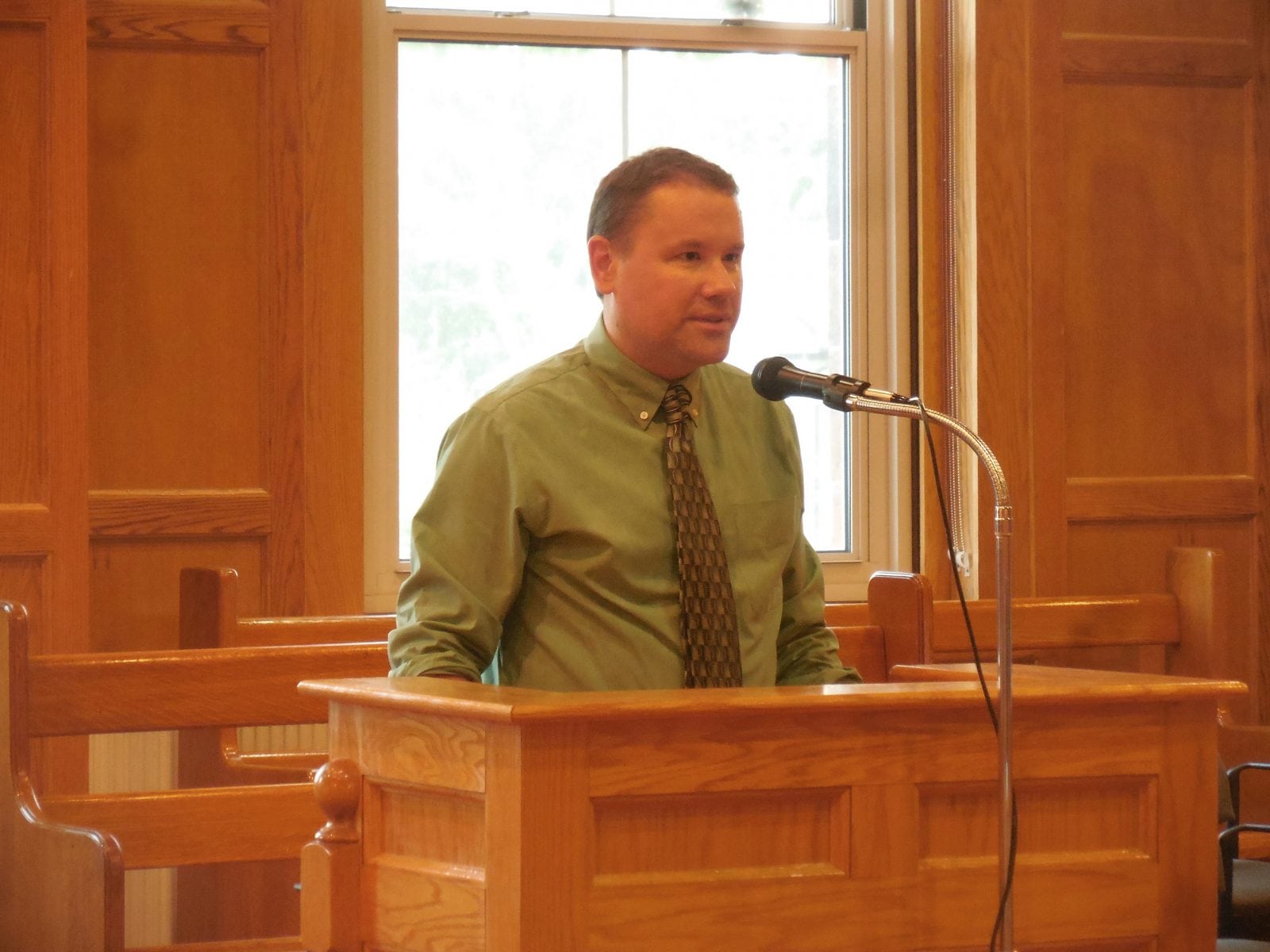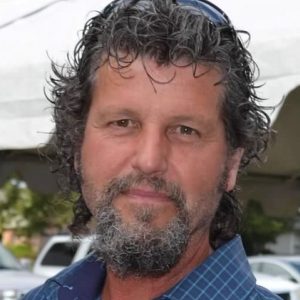
City Planner Jay Vinskey presents marijuana zoning amendment at City Council on Thursday.
WESTFIELD – City Planner Jay Vinskey introduced, on behalf of the Planning Board a zoning amendment for marijuana shops during a public hearing at City Council on Thursday.
He said the original zoning ordinance was written for medical marijuana, and the amendment includes recreational marijuana, with both to be treated equally as “marijuana shops.” The amendment also eliminates the current medical marijuana special permit provision to allow in the Business B district; with all marijuana shops to be only allowed in Industrial A districts
Vinskey said apart from zoning will be separate general ordinances having to do with the hours of operation, and potentially limiting the number of shops to 20% of retail alcohol sales, which in Westfield would be two or three shops.
Ward 3 Councilor Andrew K. Surprise said if the shops are limited to three, and the dispensary currently being built is one, that leaves only two, which he said is something to consider. Vinskey responded that the zoning ordinance before them deals strictly with the big picture of where shops may be located in the city.
At-large Councilor Matthew Emmershy asked where Industrial A sites are located. Vinskey said throughout the city, although most are on the north side. He added that since Industrial A is the largest non-residential zone in the city, the Planning Board did not consider it unreasonably restrictive.
Ward 1 Councilor Mary Ann Babinski said many Industrial A zones border residential zones, and asked whether people would get a chance to air their opinions. Vinskey said the ordinance reads no closer than 300 feet to residential, or special permits would be required.
At-large Councilor Nicholas J. Morganelli, Jr. asked about public safety issues. Vinskey said security is so highly regulated by the state; the city really doesn’t need to do anything.
At-large Councilor Brent B. Bean, II asked Vinskey to talk about what local regulations can and cannot do. Vinskey said local regulations are outside of the state regulations, but cannot conflict with them. Ward 3 Councilor Michael Burns asked who would be the regulating authority. Vinskey said in terms of zoning, it would be the Planning Board, but in terms of the actual license, it would be the state. “There is no requirement that the city get involved,” Vinskey said, although he added that the Board of Health probably would.
After the public was invited to speak, resident Brian Hoose said this is opening up a whole new area for Westfield. He said there will be other communities that will not allow it, and locations are going to be important. He said there will be a market to the college community, to entertainment, music, cultural, and food arenas; apologizing at the same time for stereotyping. Hoose encouraged the City Council to get it started.

Westfield attorney Thomas Keenan at public hearing.
Westfield Attorney Thomas Keenan said he has been involved for the last three years in the issue, adding later that he and a partner are looking into the business. He said the zoning ordinance can regulate time, place and manner, and that there is good guidance on the Cannabis Control Commission (CCC) website.
Keenan also said right now Westfield is the closest border town to Connecticut to allow marijuana shops, with Holyoke, Chicopee and Springfield also opening up. He said the amount of retail stores in Hampden County will be 10-15 at the most. He said that 15 to 20% of the adult population use cannabis right now, although less than 1% of residents in Massachusetts (10,000) have cards. He foresees 63,000 adult users in the area, adding that the city could see revenues of a million or more per dispensary.
City Advancement Officer Joe Mitchell introduced himself as “the pot guy for the city, like it or not.” He said since Westfield voted 893 to 800 in favor of passage of recreational marijuana in November of 2016, the city can’t keep it out. He also said the city can tax each business 3%, if the funds are used for community impact and police training.
Mitchell also said that over the past year, the CCC has allowed operations similar to package store purchases, but not consumption on site, which he said would take another year and a half for them to regulate. “I’m in support of it; it’s well crafted,” Mitchell said of the zoning amendment.
“If they’re coming, they’re coming. As the Advancement Officer, would you rather see this in the core district, or people flocking to the outskirts and getting on the highway,” asked Emmershy.
Mitchell said he has had 16-20 calls from groups making inquiries. He said two-thirds of them want to do cultivation, one of several aspects of the business in addition to processing, testing, research and development, and transportation. He said one entity wants to do transportation and processing. “Two thirds of the people right now want to be in Industrial A,” Mitchell said, adding that it is ultimately up to the City Council. He said the minimum would be three licenses, but they could allow more, and could open it up beyond Industrial A. He gave the hypothetical example of a retail shop on College Highway, which would be accessible to Southwick, Agawam, West Springfield and Connecticut.
Mitchell also said as far as downtown locations, they should wait another 18 months to two years, until the CCC regulations regarding consumption on premises have been established.
Vinskey added that the Planning Board discussed downtown at length, and wanted to wait.
Resident Estelle Streeter spoke up about the availability of medical marijuana to residents, giving examples of older friends having to take opioids for pain, because of a lack of proper testing of marijuana. “There are so many benefits,” Streeter said, adding that now medical schools in Massachusetts, “some of the greatest in the world,” will be able to do the testing. “The whole country has an aging population. 80% of seniors say they want that. Something to think about,” Streeter said.
Resident Marc Lichwan also spoke in favor of the zoning amendment. “A lot of neighboring towns are waiting to see what happens with other towns, including Westfield,” he said. Calling it the next million dollar industry, Lichwan suggested that the City Council not let it get bogged down. “There will be multiple people coming to Westfield,” he said.
Legislative and Ordinance sub-committee chair Ralph J. Figy then made a motion to refer the zoning amendment to L&O and the Law Department.




